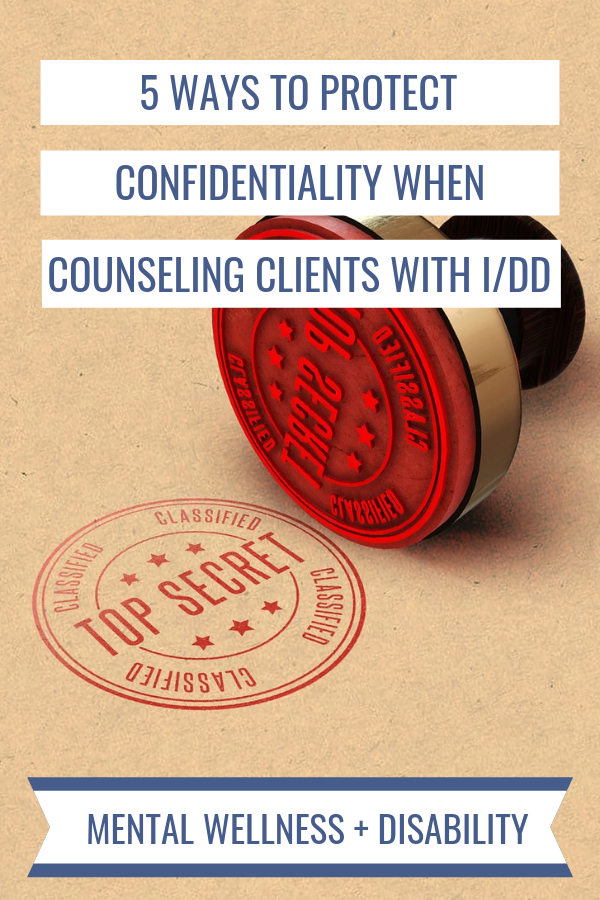Confidentiality is a cornerstone of counseling. A client must trust that their best interest and privacy are at the forefront of all the therapist’s decisions. This includes keeping information that the client has shared confidential. It also means not disclosing that a person is in counseling or has been in the past.
There are some unique ethical considerations when counseling clients with intellectual and developmental disabilities. Clients with disabilities may not see the importance of confidentiality for their protection. My clients may not be aware of the risks they face if other people know that they are in counseling or why.
For these reasons, confidentiality is an ongoing topic of conversation. It’s one that I will frequently revisit with clients.

Here are some of the ways that I protect the confidentiality of counseling clients with intellectual and developmental disabilities
I don’t discuss confidentiality with my clients, I show it to them
Before a new client comes to see me, they have signed my electronic practice documents. These forms outline my commitment to confidentiality. They also explain the times when I am obligated to disclose something a client has told me in confidence.
But, when a client with I/DD comes to see me for the first time, I don’t assume that they’re clear on confidentiality. I’ll discuss with them in person what confidentiality means.
Many of my counseling clients with I/DD thrive when I present information concretely and visually.
So, I don’t just talk to my clients about confidentiality. I show them what confidentiality is.
I show my clients some of the ways that I protect their confidentiality in my office. These include adjusting the blinds so that sunlight can get in, but no one can see into the office from the outside.
I’ll also show them the white noise and sound machines that are around the office to muffle conversation. Some clients like to try them out. I’ll leave a podcast playing on my Bluetooth speaker in the office. Then we’ll sit in the waiting room. Together we’ll hear the difference between when the noise machines are on and when they’re off. I use this opportunity to talk about why it’s important that what they share in counseling stay private.
Role play what things are OK to do if we meet in the community
Cary, North Carolina has been my home since I was in high school. One of the charms of living in Cary is that I’m almost always guaranteed to run into someone I know when I go out.
This includes my clients. I’ve run into clients at the grocery store and at Kids Together Playground. I’ve seen a few clients while grabbing a soda and working on blog posts on the patio outside of Corbett’s.
Of course, I’m also likely to run into clients in professional settings. It’s common for me to present to self-advocates and see current and former clients in the audience.
I’m up front with my clients and tell them that we may run into each other out in the world at some point.
I don’t like to just have a discussion around this possibility.
I like to engage my clients in role-playing sessions. These help them think through how they’ll navigate our meeting. I assure my clients that it’s perfectly fine with me if they want to act as if they don’t know me. I guarantee them that I’ll never start a conversation with them or give any other outward clues that I know them.
This interaction can be difficult for many of my clients who have had social skills training in the past. They may fear that they are being rude, or worse, they may think that I am being rude by ignoring them. I always invite my counseling clients with I/DD to practice this. That way they know it really is OK for them to ignore me in public if they choose to.
Of course, I also let them know that they’re welcome to approach me and start a conversation. We discuss that, if they do say hello, other people may ask them how they know me. People may even assume that I was their therapist if this happens in a professional setting.
We practice ways they can answer this if they don’t want to disclose that I’m their therapist. We may even create a page about running into each other in their counseling notebook. Here they can map out things they can do and say if we see each other in public. This is helpful for clients who choose to attend a workshop or talk of mine after ending therapy. They have a guide to refer to on their own for times when they know they’ll see me.
Of course, many of my counseling clients with I/DD enjoy sharing with others that I’m their therapist. I discuss with clients things that may occur if they tell others that they take part in counseling. For many of my clients, these risks include teasing about needing therapy (being ‘crazy’). Or, peers might ask about what happens in counseling, a question that my clients might not want to answer.
When someone ends therapy, I always suggest that we have a formal termination session. I want my clients to have a chance to reflect on the progress they’ve made because of their hard work in counseling. I also view this as a perfect opportunity to revisit the conversation about what to do if they see me in public.
Managing confidentiality during non-traditional sessions
I love that I offer in-home therapy. I have seen lots of ways that clients benefit because I was willing to go to where their challenges were happening. ‘Walk-and-talk’ therapy is another non-traditional way that I may meet with clients. Some of my Autistic clients especially struggle with maintaining eye contact,. They may feel pressured to do so if we meet in a usual face to face setting. If it helps my clients to feel more at ease, I’m happy to go for a walk with them and talk while we are side by side.
But, I also know that offering sessions outside of my office poses some extra risks to confidentiality to my clients.
Someone who knows my vehicle may recognize it if it’s parked at someone’s home. They may assume that someone at the home is receiving therapy because of this. Likewise, someone who knows me may infer that a person I’m walking with near my office is a therapy client.
To address these issues, I first discuss with clients the risks of meeting with me outside of the office. For many of them, they feel that the benefit of receiving a therapy that will be more helpful to them than in-office counseling outweighs the risk.
Discuss upholding confidentiality with caregivers
Sometimes caregivers break a client’s confidentiality, despite having the best of intentions. That caregiver might be a parent or a DSP. Sometimes caregivers will approach me at profession events and want to share information about my client. Or, they may ask me to plan with them about how to manage a new behavior at these very public events.
Of course, I understand that these concerned parents and caregivers are trying to help my client. Unfortunately, they’ve announced to a roomful of strangers that the person they’re discussing is my counseling client. No matter how I respond, it’s clear to everyone else listening what my relationship to this family is.
Or, sometimes parents will get frustrated trying to articulate something to their child’s teacher or grandparent. Without warning, they will tell this person to call me for more insight. The trouble is, without a release of information, I can’t discuss anything with this person. In fact, I can’t even ethically acknowledge whether the person they’re calling about is or is not a client of mine. It makes for an awkward conversation. It often leads to increased stress for the parent who was just trying to make things clear.
These examples highlight why I include caregivers in discussions about confidentiality.
Triple checking how and when I share clients’ information
Working with clients with disabilities, I know that’s sometimes helpful to involve others in treatment.
But, I also know that adults with I/DD may be prone to some communication tendencies. These can make it tricky to know what confidential information they are OK with me sharing. The two most common of these are:
- Serial position effects: The tendency to remember (and be able to restate) the first and last items presented in a list better than those items presented in the middle. Remembering items presented first is called “primacy effect”. Remember items presented at the end of the list is called “recency effect”.
- Acquiescence: The tendency to answer “Yes”, even if you don’t agree with something.
An example of how to ethically confirm what confidential information a client with I/DD wants shared in counseling
Suppose I’m seeing a client, Peter, who has Down syndrome. Peter’s family tells me that Peter has been irritable since their family dog died. His parents worry that Peter might have Depression.
When I talk with Peter, he shares something with me that he hasn’t told his parents. He tells me that he’s worried that the ghost of his dead dog will come back to hurt him when he’s sleeping. He’s been staying awake a lot at night, and that’s made him grouchy during the day.
I believe that it would help Peter for his family to have this information. That way, they can support Peter at bedtime and during any nighttime wake-ups. Without this knowledge, his parents can’t help Peter to overcome his anxiety.
Here’s how I’ll approach my desire to share this information with Peter’s family during my session with Peter:
Ask an open-ended question:
“Peter, you told me that you are scared to fall asleep at night. You also said that you want to change that. You want to sleep at night again and not feel scared. Who in your family can help you with that?”
I’ll punctuate this request with a visual, showing Peter in my notes where I’ve written down what he’s said.
Let’s suppose that Peter indicates that his Dad can help.
Immediately follow up with a yes/no question:
“OK, you think it will help to tell your Dad about your worries. Is your Dad who you want me to tell?”
Ask as a list of items question:
Later in the session, I’ll ask the question another way. I’ll normalize that it can be helpful to have family members ‘on our team’ when we’re trying to beat anxiety. I’ll say:
“Peter, it sounds like it might help for your family to know about your worries. That way, they can help you to feel safe at night and be able to fall asleep. Who in your family should well tell about this? Your sister, your Dad, or your Mom?”
In phrasing the question, I won’t position the target person at either the start or the end of the list. That way, I’ll avoid serial position effects.
Ask again as an open-ended question:
Finally, just before we invite Peter’s Dad to join us to wrap up, I’ll ask Peter an open-ended question. I’ll say “Ok, Peter, let’s check-in. Remind me, what are the things we talked about today that you want to talk to your Dad about?” If it’s helpful, I may show Peter a list of the concerns he addressed in the session, so that he has a bank to select from.
If you’re a counselor who doesn’t work with clients with disabilities, this may sound like a tremendous amount of conversation to have about one disclosure.
But, I have seen many times how asking in a variety of ways has helped my clients to identify what it is that they want to share, and with whom.
I’d love to hear from you. Are you a therapist working with clients with I/DD?
Have you got any additional strategies that you use to be sure that you maintain your clients’ confidentiality? Please share them in the comments!
Keep reading
Other posts you may be interested in
How to Know if Someone is a Real Friend. A Quiz for Teens and Adults with IDD.
In my counseling practice, I offer mental health counseling for teens and adults with IDD. Many of my clients who have Down syndrome, Cerebral palsy, and other disabilities have lots of meaningful friendships in their lives. But sometimes, they ask “how can I know if someone is a real friend?” Maybe you have a friend […]











